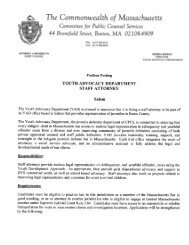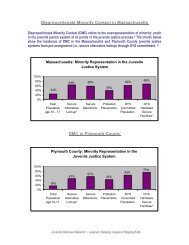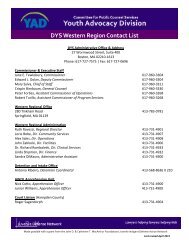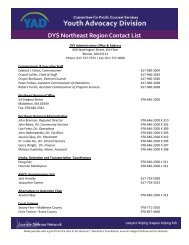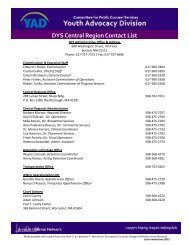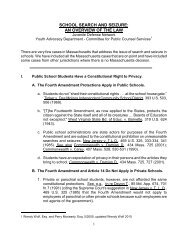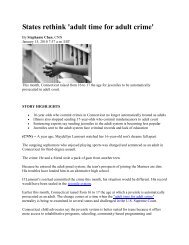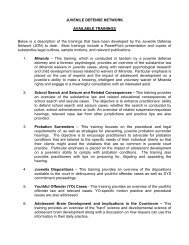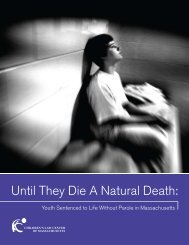health and counseling edition - the Youth Advocacy Division
health and counseling edition - the Youth Advocacy Division
health and counseling edition - the Youth Advocacy Division
Create successful ePaper yourself
Turn your PDF publications into a flip-book with our unique Google optimized e-Paper software.
FALL 2008<br />
COMMUNITY NOTEBOOK: HEALTH AND COUNSELING EDITION<br />
(Continued from page 13)<br />
Lindemann Mental Health Center. Evaluations are<br />
often scheduled through <strong>the</strong> Call Center <strong>and</strong><br />
directed to one of <strong>the</strong>se sites based on <strong>the</strong><br />
convenience of <strong>the</strong> location for <strong>the</strong> client.<br />
Although connection with <strong>the</strong> Call Center is<br />
preferred, both Urgent Care Centers are able to<br />
accept walk-ins. Particularly for youth <strong>and</strong><br />
families, <strong>the</strong> Urgent Care Centers are <strong>the</strong> ideal<br />
alternative to an unnecessary emergency room<br />
visit. Boston emergency departments experience<br />
an extremely high patient volume. Wait times for<br />
a psychiatric evaluation are often upwards of four<br />
hours. During that lengthy period of time, it can<br />
RESOURCE<br />
HIGHLIGHT<br />
THE TRAUMA CENTER AT JUSTICE<br />
RESOURCE INSTITUTE<br />
The Trauma Center is a program of Justice<br />
Resource Institute, a large nonprofit<br />
organization dedicated to social justice by<br />
offering hope <strong>and</strong> promise of fulfillment to<br />
children, adults, <strong>and</strong> families who are at risk<br />
of not receiving effective services essential<br />
to <strong>the</strong>ir safety, progress, <strong>and</strong>/or survival. The<br />
Trauma Center provides comprehensive<br />
services to traumatized children <strong>and</strong> adults<br />
<strong>and</strong> <strong>the</strong>ir families. Programming includes:<br />
Parent-Child Interaction Therapy, prolonged<br />
traumatic stress <strong>the</strong>rapy, GLBTQ Program as<br />
well as o<strong>the</strong>r outpatient mental <strong>health</strong><br />
services.<br />
Trauma Center at<br />
Justice Resource Institute<br />
1269 Beacon Street<br />
Brookline, MA 02446<br />
(617) 232-1303<br />
Intake: (617) 232-0687<br />
be quite traumatizing, particularly for youth, to be<br />
exposed to <strong>the</strong> sights <strong>and</strong> sounds of acute<br />
medical emergencies. The Urgent Care Centers<br />
offer extremely reduced waiting times, often<br />
seeing referrals immediately upon arrival. The<br />
waiting areas are much more pleasant offering<br />
play space for families with children.<br />
Whe<strong>the</strong>r it occurs at <strong>the</strong> Urgent Care<br />
Center, <strong>the</strong> emergency department, or at <strong>the</strong><br />
youth’s school, once a referral is made, an<br />
emergency services clinician will conduct a faceto-face<br />
evaluation. The clinician will provide an<br />
acute clinical risk assessment <strong>and</strong> individualized<br />
diagnostic <strong>and</strong> treatment formulations.<br />
Assessments include: presenting problems <strong>and</strong> a<br />
narrative of how <strong>and</strong> why <strong>the</strong> youth is presenting<br />
at this time; immediate safety concerns from <strong>the</strong><br />
points of view of <strong>the</strong> youth, guardians, <strong>and</strong><br />
referring parties; crisis precipitants; internal <strong>and</strong><br />
external supports; history of relevant past<br />
symptoms; medical <strong>and</strong> substance abuse comorbidities;<br />
relevant legal issues; school<br />
performance; <strong>and</strong> current mental status exam.<br />
Following <strong>the</strong> evaluation <strong>and</strong> consultation<br />
with existing treatment providers, <strong>the</strong> clinician will<br />
develop a treatment plan. Believing that youth<br />
are best served by remaining in <strong>the</strong>ir communities,<br />
BEST aims to provide <strong>the</strong> link to appropriate<br />
community based treatment <strong>and</strong> supportive<br />
services. A perfect example of one such service is<br />
a Family Stabilization Team (FST). FST’s are viewed<br />
to be particularly important for child <strong>and</strong><br />
adolescent populations as, frequently, ongoing<br />
family problems perpetually drive crisis behaviors.<br />
FST’s offer <strong>the</strong> possibilities of intervening on <strong>the</strong>se<br />
problems at <strong>the</strong>ir source, working within <strong>the</strong> family,<br />
<strong>and</strong> responding directly to crisis both at home <strong>and</strong><br />
school. If it is determined that <strong>the</strong> youth cannot<br />
be safely maintained in <strong>the</strong> community, even with<br />
<strong>the</strong> support of community based services, BEST<br />
would arrange for a more restrictive level of care,<br />
such as a Community Based Acute Treatment<br />
Program, or an inpatient psychiatric<br />
hospitalization. Although <strong>the</strong>se levels of care are<br />
necessary to stabilize acutely psychiatrically-ill<br />
patients, BEST seeks to exp<strong>and</strong> relationships with<br />
<strong>the</strong> community to encourage referrals prior to<br />
such an extreme exacerbation of symptoms.<br />
EVERY YEAR MORE THAN ONE MILLION<br />
YOUTH UNDER THE AGE OF 18 COME IN<br />
CONTACT WITH SOME ASPECT OF THE<br />
JUVENILE JUSTICE SYSTEM...UP TO 80%<br />
HAVE DIAGNOSABLE MENTAL HEALTH<br />
DISORDERS...MANY OF THESE CHILDREN<br />
GO WITHOUT TREATMENT, BOTH IN THE<br />
COMMUNITY AND DURING<br />
INCARCERATION.<br />
National Center for Mental<br />
Health <strong>and</strong> Juvenile Justice, 2006<br />
Adequately addressing mental <strong>health</strong><br />
issues in a pre-crisis stage prevents fur<strong>the</strong>r<br />
development of problematic behaviors that could<br />
lead to school failure, involvement with <strong>the</strong><br />
juvenile justice system, or psychiatric<br />
hospitalization. It also increases <strong>the</strong> likelihood that<br />
community-based services will adequately<br />
stabilize <strong>the</strong> situation. <strong>Youth</strong>-serving professionals<br />
are encouraged to access services through <strong>the</strong><br />
BEST program whenever <strong>the</strong>y believe a child or<br />
adolescent may benefit from additional mental<br />
<strong>health</strong> services. Call (800) 981-HELP (4357) to<br />
access <strong>the</strong> range of services that <strong>the</strong> BEST<br />
program provides. ◊<br />
14<br />
www.youthadvocacyproject.org




